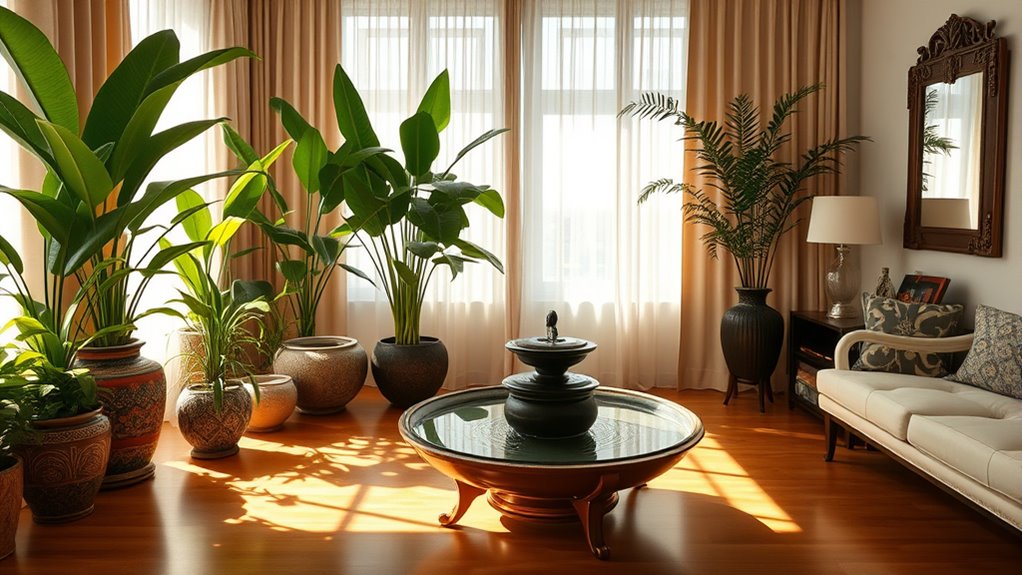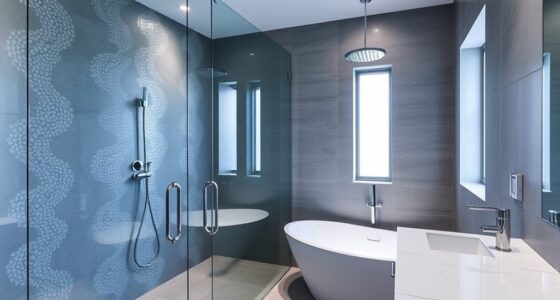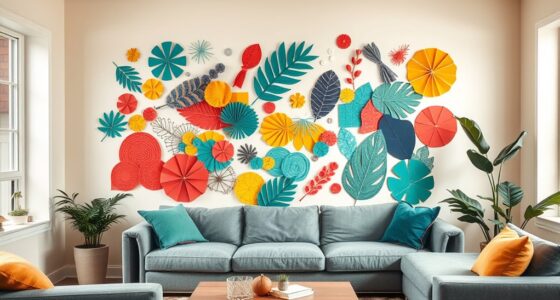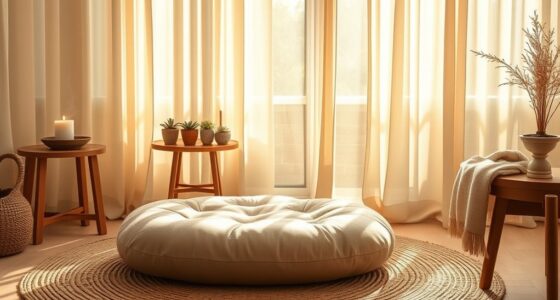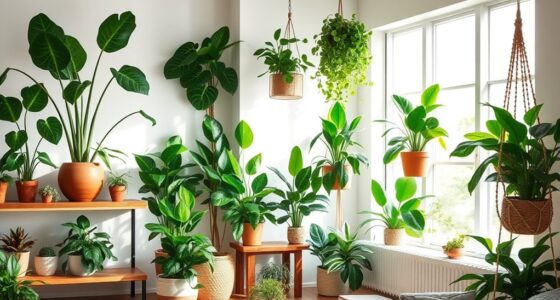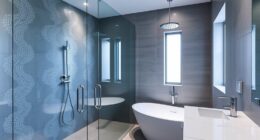Feng Shui is a practical way to arrange your home to boost positive energy, harmony, and your overall well-being. It involves organizing your space thoughtfully, using colors, furniture placement, and decluttering to guarantee energy flows freely. When you create a balanced and welcoming environment, you’ll feel more calm, energized, and in control. Keep exploring to discover how small changes can transform your home into a true sanctuary for you.
Key Takeaways
- Feng Shui is an ancient Chinese practice that arranges your home to promote positive energy flow and well-being.
- Key principles include clearing clutter, optimizing furniture placement, and using harmonious color schemes.
- Proper energy flow prevents stagnation, reduces stress, and enhances mood and relationships.
- Colors in Feng Shui impact mood; bright colors energize, while softer shades promote relaxation.
- Small adjustments in space layout and decor can significantly improve harmony and overall home energy.
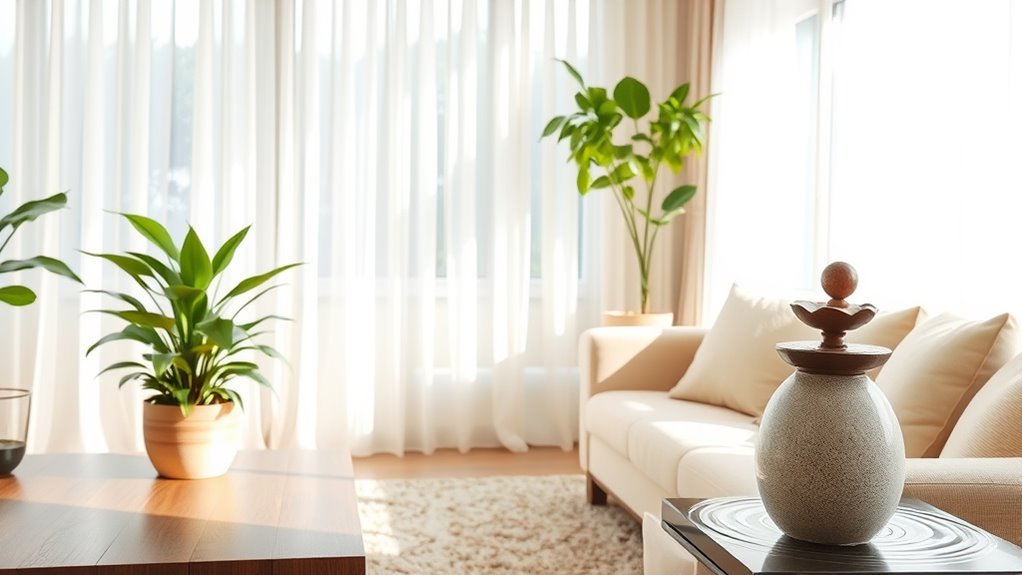
Have you ever wondered how the arrangement of your home can influence your energy and well-being? Feng Shui is all about creating harmony within your space to promote positive energy flow. When your home is arranged thoughtfully, it can enhance your mood, relationships, and overall health. One of the first steps is understanding how energy moves through your space, known as energy flow. You want your home to feel open and welcoming, not cluttered or crowded, because blockages in energy can lead to feelings of stagnation or stress. Clearing clutter and organizing your furniture allows energy to circulate freely, supporting a sense of vitality and calm. Recognizing the importance of current news and staying informed can also help you adapt your space to changes around you. Color schemes play a essential role in Feng Shui because colors directly impact your mood and energy. Bright, vibrant hues like red or orange can energize a room and stimulate enthusiasm, while softer shades like blues and greens promote relaxation and tranquility. When choosing colors for different areas of your home, consider their purpose. For example, a home office might benefit from energizing colors to boost productivity, whereas a bedroom should incorporate calming tones to foster restful sleep. You can also use color to balance the energy in a space — if a room feels too heavy or dull, adding a splash of a lively color can uplift the atmosphere. Conversely, if a space feels overly stimulating, incorporating muted or neutral tones can bring balance and peace. Another key aspect of applying Feng Shui principles is paying attention to the layout and placement of furniture. Position your furniture to facilitate a smooth energy flow, avoiding sharp angles or blocking pathways. For instance, placing your bed so you have a clear view of the door while not directly in line with it helps create a sense of security and control. The arrangement of furniture and the choice of colors work together to shape the overall energy in your home. When you prioritize open spaces, harmonious colors, and thoughtful placement, you allow positive energy to circulate and settle comfortably. Ultimately, Feng Shui isn’t about strict rules but rather about tuning into how your space makes you feel. By paying attention to energy flow and using color schemes intentionally, you can transform your home into a sanctuary that supports your well-being. Small adjustments can make a meaningful difference, helping you feel more balanced, energized, and at peace in your everyday environment.
Frequently Asked Questions
Can Feng Shui Be Applied in Small Apartments Effectively?
Absolutely, you can apply feng shui effectively in small apartments. Focus on space optimization by decluttering and arranging furniture to maximize flow. Use color schemes that promote calm and energy, like soft blues or warm neutrals, to enhance your space. Small apartments benefit from strategic placement and thoughtful decor, making the environment feel larger and more harmonious. With these adjustments, you’ll create a balanced, positive atmosphere despite limited space.
What Are Common Feng Shui Mistakes to Avoid at Home?
You want to avoid common feng shui mistakes by keeping clutter cleared, which blocks energy flow and creates stagnation. Don’t place furniture in direct line with doors, as it hampers positive energy movement. Keep your space tidy, especially around entryways, to invite good chi. Be mindful of sharp corners or cluttered spaces that disrupt energy flow. Regular clutter clearing and mindful placement help create a harmonious and balanced home environment.
How Long Does It Take to See Feng Shui Improvements?
Imagine planting a seed and waiting for it to sprout—that’s similar to seeing feng shui improvements. Usually, within a few weeks to a few months, you’ll notice changes, but the timeframe expectations vary based on your efforts and space. Patience requirements are key; some effects might take longer to manifest. Stay consistent and mindful, and you’ll gradually see positive shifts in your home’s energy.
Is Feng Shui Compatible With Other Interior Design Styles?
You’ll find feng shui is quite compatible with other interior design styles, as it promotes harmony blending rather than strict rules. By integrating feng shui principles, you can enhance your space’s flow while maintaining your unique style. Whether your taste is modern, rustic, or eclectic, style integration becomes seamless when you focus on balance and positive energy, creating a home that’s both beautiful and energetically aligned.
Do I Need to Consult a Feng Shui Expert for My Home?
You don’t necessarily need an expert consultation to apply feng shui basics in your home. Many principles are simple and can be learned through books or online resources. However, if you’re looking for personalized guidance or want to optimize your space fully, consulting a feng shui expert can be beneficial. They can identify specific adjustments tailored to your home, ensuring you incorporate feng shui effectively and harmoniously.
Conclusion
Now that you’ve learned the basics of Feng Shui, you’re ready to turn your home into a sanctuary of positive energy. Think of it as tuning a musical instrument — when everything’s in harmony, your space will feel balanced and inviting. Just remember, small changes can make a big difference. Trust your intuition, and watch as your home transforms into a haven where good energy flows effortlessly, like a gentle river guiding you to peace.
